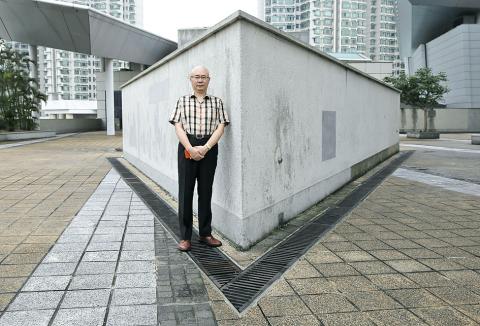The publisher of a leading magazine on Chinese and regional defense issues says he is leaving Hong Kong out of concern he could be targeted by China’s state security bodies, a further sign of how Beijing’s growing presence is chilling the political atmosphere in the territory.
Publisher Andrei Chang (張毅弘), who publishes the English-language Kanwa Asian Defense and Chinese-language Kanwa Defense Review yesterday said that the suspected abductions of booksellers tied to a Hong Kong publisher of tomes about sensitive Chinese political topics had left him shocked and concerned, prompting him to decide to move to Tokyo next month while continuing to publish his magazines in Hong Kong.
“Once you know someone who’d been kidnapped, you start to wonder if you’ll be next,” said Chang, a Canadian citizen who was born in China and who knows the men in the case. “We have to think tactically.”

Photo: AP
Chang is a top authority on China’s People’s Liberation Army (PLA) and also writes about Chinese leadership issues.
Hong Kongers such as Chang were stunned by the recent temporary disappearances of Swedish-Chinese author Gui Minhai (桂民海) and four colleagues associated with the Causeway Bay Bookstore, including his British chief editor Lee Bo (李波). That was due in part to suspicions that Chinese security agents snatched Lee and spirited him across the border, while Gui was taken from Thailand to China.
Although many ethnic Chinese in Hong Kong, including Chang, hold foreign passports as a sort of insurance policy in case of a crisis, the difficulties Britain and Sweden faced in getting consular access to Lee and Gui raised doubts about that strategy.
Three of Gui and Lee’s colleagues are now free on bail in China, but the pair appear to be still detained without charge.
In related news, Beijing has told the EU to stay out of its internal affairs in response to criticism that China’s investigation of the five Hong Kong booksellers undermined the territory’s autonomy and damaged its rule of law.
The EU on Monday released its annual report on the Hong Kong in which it said the investigation by Chinese authorities of five men had raised concerns about respect for human rights, fundamental freedoms and the rule of law.
The case is “the most serious challenge” to Hong Kong’s political autonomy, the report said.
ADDITIONAL REPORTING BY STAFF WRITER

Airlines in Australia, Hong Kong, India, Malaysia and Singapore yesterday canceled flights to and from the Indonesian island of Bali, after a nearby volcano catapulted an ash tower into the sky. Australia’s Jetstar, Qantas and Virgin Australia all grounded flights after Mount Lewotobi Laki-Laki on Flores island spewed a 9km tower a day earlier. Malaysia Airlines, AirAsia, India’s IndiGo and Singapore’s Scoot also listed flights as canceled. “Volcanic ash poses a significant threat to safe operations of the aircraft in the vicinity of volcanic clouds,” AirAsia said as it announced several cancelations. Multiple eruptions from the 1,703m twin-peaked volcano in

China has built a land-based prototype nuclear reactor for a large surface warship, in the clearest sign yet Beijing is advancing toward producing the nation’s first nuclear-powered aircraft carrier, according to a new analysis of satellite imagery and Chinese government documents provided to The Associated Press. There have long been rumors that China is planning to build a nuclear-powered aircraft carrier, but the research by the Middlebury Institute of International Studies in California is the first to confirm it is working on a nuclear-powered propulsion system for a carrier-sized surface warship. Why is China’s pursuit of nuclear-powered carriers significant? China’s navy is already

Chinese President Xi Jinping (習近平) launched a week-long diplomatic blitz of South America on Thursday by inaugurating a massive deep-water port in Peru, a US$1.3 billion investment by Beijing as it seeks to expand trade and influence on the continent. With China’s demand for agricultural goods and metals from Latin America growing, Xi will participate in the APEC summit in Lima then head to the Group of 20 summit in Rio de Janeiro next week, where he will also make a state visit to Brazil. Xi and Peruvian President Dina Boluarte participated on Thursday by video link in the opening

IT’S A DEAL? Including the phrase ‘overlapping claims’ in a Chinese-Indonesian joint statement over the weekend puts Jakarta’s national interests at risk, critics say Indonesia yesterday said it does not recognize China’s claims over the South China Sea, despite signing a maritime development deal with Beijing, as some analysts warned the pact risked compromising its sovereign rights. Beijing has long clashed with Southeast Asian neighbors over the South China Sea, which it claims almost in its entirety, based on a “nine-dash line” on its maps that cuts into the exclusive economic zones (EEZ) of several countries. Joint agreements with China in the strategic waterway have been sensitive for years, with some nations wary of deals they fear could be interpreted as legitimizing Beijing’s vast claims. In 2016,